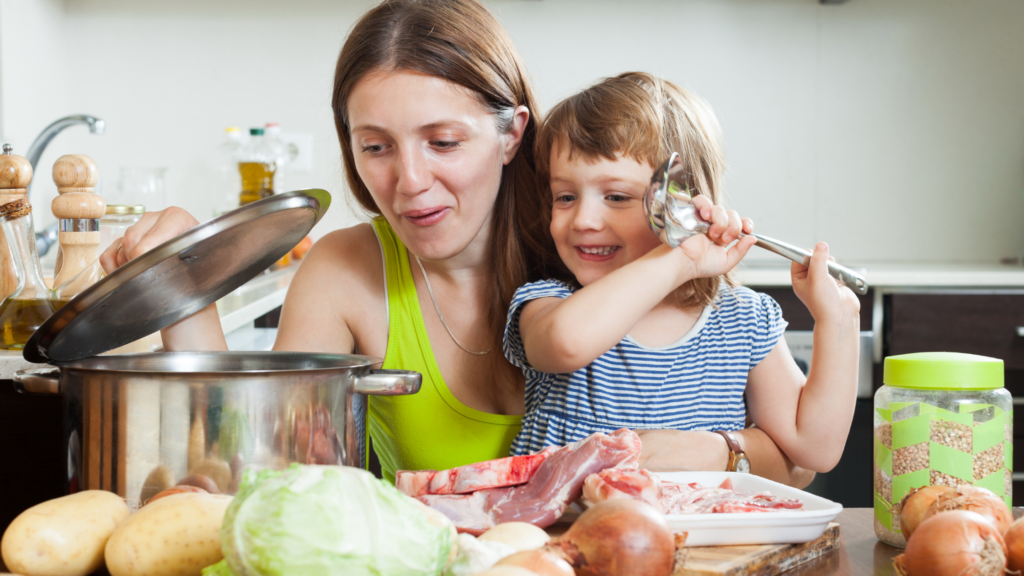“Why is my child not eating?” “Is my child eating enough?” “Is my child eating the right food?” “How can I get my child to eat?”
If your child is not eating this is not your fault.
Every parent has gone through this mealtime dilemma and feeling guilty is a by-product of parenting, isn’t it?
But as weird as it sounds, that is in most cases, the beginning of the problem.
So, the “not eating” issue usually arises when the little ones sense this big concern that goes around their parents. As toddlers and preschoolers are highly aware of mums and dads behaviours, when they notice that they have the power of “changing it”, this will generate curiosity, and oops… time to test the boundaries and explore this area!
Normally, that’s because kids feel secure in their parents’ love, and they begin to feel confident to explore some of these interesting areas, such as power, control, independence, testing, etc. – Yay!
It doesn’t mean your child is manipulative or is trying to upset you. This is a normal behaviour that consists in resisting parents and “see what happens”.
Isn’t it amazing to realize how children have a lot more dominance over us than we often feel we have over them?

That is, when children decide not to eat, it does not mean that they do not like the food you have prepared or that they are ungrateful children. This is just a reflection of the need that young children have to test their power and our leadership.
Fun stuff!
So, how to get around this situation and not let your concerns about your child not eating become a problem during mealtimes?
Assuming that this is not a health problem, and you have already checked with a doctor that there is nothing “abnormal” going on, here are some suggestions:
Positive eating environment
Mealtimes should be a happy and social family occasion. Make it a special opportunity in which you can all sit together and enjoy a nice meal.
Be present in the moment with your child and show her/him how much you enjoy eating the food you’ve prepared.
If your children show interest in helping to prepare and cook with you then let them help. It will make mealtimes something cool between you and them.

Let go
Forcing your child that is not eating to finish everything on the plate, will help nothing and will only make mealtimes very stressful.
Children are very good at judging how much food they need. It’s your responsibility to offer healthy food for your kids, but it’s their job to know how much they want to eat. Your child won’t starve, and you have got to trust your little one on it!
Trusting is the key to every aspect of parenting, and it’s even more important at mealtime. Offer some healthy options and let it go. Let your child do the rest, and you will see how capable they are of staying in tune with their own physical needs for food.

Try to think of it this way:
Parents’ role: Decide what the child will eat, where, and when.
Child’s role: decide whether they will eat (they can refuse), how much and when to stop.
Small portions
Some parents can overestimate how much food their child should have. A few spoons is enough to start, especially if your child is not eating much. Small portions are less overwhelming and may look more interesting on the plate.
Give choices
Children typically go through appetite phases, and just like adults, sometimes they’re not hungry.
So, present your children with the options of food they can have. Put small portions on the plate and trust your child to eat how much they need.
What if they don’t eat?
Well, if your child is not eating, then gently and respectfully you can say: “Oh! I see you’re not hungry now, and sometimes I feel the same way. I’ll put this away and the next mealtime won’t be long, so we can try again!”
Acknowledge
I can’t stress enough the importance of acknowledging children’s feelings and emotions.
But when you do it.. Please, mean it!
Children can sense when you’re “just saying”.
“It seems your tummy is full right now”; “Perhaps you are not feeling as hungry as I thought – but that’s okay we can save it for later”; “I see you’re not eating, maybe we should do something else and wait until the next meal!” are just some ideas. Show your child that you understand that he/she is just not hungry or not happy with that food at that specific moment. That’s not a big deal. You can always try later!
Respect and Trust
Your children already know what their bodies need and since very little they are capable of determining how much of food they should eat.
When you trust in your children you’re teaching them to trust and listen to themselves too.
By accepting their own decision to not having a specific food at a certain time will tell them that you trust they are in control of their own body which only belongs to themselves.

As hard as it can sound try not to get upset or frustrated if your child is not eating and acting out with food. Keep cool and say something like “I see you’re throwing food on the floor. I believe you’re done. Let me help you”.
Your child is a whole person and should be respected as such.
Children are capable of enjoying vegetables and healthy food if we trust that they are.
So, mealtime shouldn’t be a battle but a wonderful opportunity for children and parents to explore tastes, textures and preferences – together!
What are the biggest challenges with your child that is not eating? Comment here!


 My name is Natalia, sweetly called "Lala" since I started working with children. I am the owner of Lala’s Family Day Care and my passion is to make positive connections with my little ones, providing high-quality learning experiences. I believe that every child is unique and they grow the best when they feel valued, loved, happy and secure.
My name is Natalia, sweetly called "Lala" since I started working with children. I am the owner of Lala’s Family Day Care and my passion is to make positive connections with my little ones, providing high-quality learning experiences. I believe that every child is unique and they grow the best when they feel valued, loved, happy and secure.